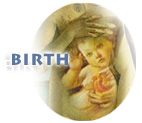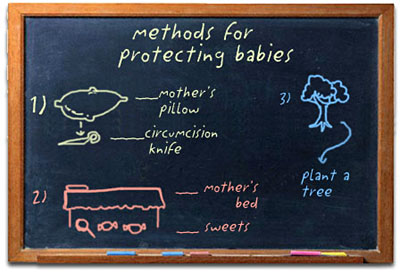|


|
Birth is a mysterious and powerful experience that inspires awe
and anticipation, but is also ridden with anxiety. Earlier societies
responded to the risks and wonders of childbirth with a wide variety
of customs aimed at increasing human control of the situation to
the extent possible and protecting the mother and child from harm.
In many cases, Jews adopted and adapted customs borrowed from their
neighbors and gave them specifically Jewish contents and emphasis.
|
Folk
Methods for Reducing the Pain of Childbirth
The
problem of relieving the pains of childbirth found many solutions. In
medieval Europe, besides the purely magical treatments, there were many
folk remedies of a dubious character, e.g. the suggestion that the woman
be fed mother's milk, the idea probably being that it may transmit to
her another woman's success in surmounting the ordeal. Several prescriptions
suggest primitive attempts at anesthesia; one such requires that a strong
frankincense be burned before the parturient woman (but it must be in
a "new clay bowl"); another that she inhale the smoke of burning
felt. The effect of this last, however, is thus naively described: "The
woman will sneeze and expel her infant!"[1]
During difficult labor, Ashkenazi Jews would sometimes put a Torah binder
around the belly of the woman, or put the keys to the synagogue in her
hands.[2]
Folk Methods for Protecting the Baby After Birth
  Placing the circumcision knife under the pillow of the mother the night
before the Brit, to protect her from demons. Follows similar customs
in other cultures where weapons of iron are kept near newborns.
Placing the circumcision knife under the pillow of the mother the night
before the Brit, to protect her from demons. Follows similar customs
in other cultures where weapons of iron are kept near newborns.
 Amulets to ward off evil spirits are used in many traditions, but Jewish
amulets contain verse from Psalms, especially the verse, "The sun
shall not smite thee by day, neither the moon by night." (Psalm 21:6).
Amulets to ward off evil spirits are used in many traditions, but Jewish
amulets contain verse from Psalms, especially the verse, "The sun
shall not smite thee by day, neither the moon by night." (Psalm 21:6).
 The custom of not announcing a child's name until the circumcision or
naming ceremony comes from the Talmudic concept that the baby is not entirely
viable until the eighth day.
The custom of not announcing a child's name until the circumcision or
naming ceremony comes from the Talmudic concept that the baby is not entirely
viable until the eighth day.
 Garlic and red ribbons were placed on the baby's crib to protect it from
the evil eye, or demons. Lilith, one such demon, is specifically suspected
of stealing small children for herself, since, as legend has it, she is
forever bitter about her own inability to bear children.
Garlic and red ribbons were placed on the baby's crib to protect it from
the evil eye, or demons. Lilith, one such demon, is specifically suspected
of stealing small children for herself, since, as legend has it, she is
forever bitter about her own inability to bear children.
 Yemenite Jews place sweets under the bed of the new mother to occupy the
evil spirits and to draw attention away from the baby.
Yemenite Jews place sweets under the bed of the new mother to occupy the
evil spirits and to draw attention away from the baby.
 In ancient Israel, it was customary to plant a tree for the new baby.
In ancient Israel, it was customary to plant a tree for the new baby.
 Even today, anxiety informs behavior during pregnancy. One woman confessed
that she responded to any and all charity solicitations during her pregnancies.
"That's the time when you really can't fool around," she said.[3]
Even today, anxiety informs behavior during pregnancy. One woman confessed
that she responded to any and all charity solicitations during her pregnancies.
"That's the time when you really can't fool around," she said.[3]
 |
[1]
Joshua Trachtenberg, Jewish Magic and Superstition:
A Study in Folk Religion (New York: Behrman's Jewish Book House,
Inc., 1939 paperback edition published by Atheneum and reprinted
by arrangement with the Jewish Publications Society of America,
1974), p. 188. [back]
[2]
Rabbi Douglas Weber and Jessica Brodsky Weber, The
Jewish Baby Handbook: A guide for expectant parents,) New York:
Behrman House, 1990), p. 12. [Back]
[3]
ibid. pp. 12-13. [back]
|
|



